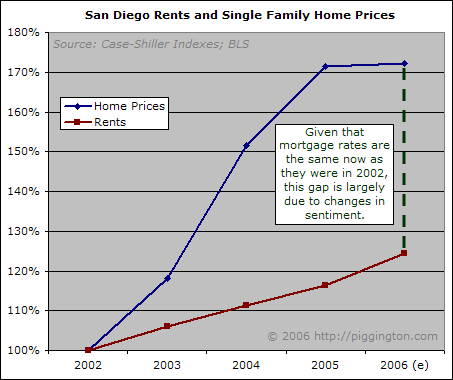Low rates have been one of the mainstays of the bullish arsenal. But given that mortgage rates are where they were four years ago, then they shouldn’t be a factor in explaining any price difference that has taken place during that time period.
So if we take rates out of the picture, we are left with population, housing stock, inflation, and incomes: all factors that would affect both rents and home prices. Which is to say, if rates are the same now as they were four years ago, why should home prices have risen so much more than rents during that time?

As the chart indicates, the answer is "sentiment." Rates are no longer an excuse (not that they ever were, for reasons discussed in the last credit market report). The gap between rental growth and home price growth over the past four years is illustrative of the speculative premium that people have come to attach to home ownership during that period.
For data nerds:
- I assumed that the ratio of rental stock to residential/owner-occupiable stock was the same throughout, although I am almost certain that residential supply increased more than rental supply (witness the condo conversion craze).
- To estimate 2006 rents I used the latest nationwide rent increase figure of 7%, though I imagine that number is smaller in San Diego due to our outmigration and population decline.
- To estimate 2006 home prices I used the latest year-over-year median price change of .4%. Pretty rough, I admit, but none of these assumptions materially affect the point I am trying to make (and for the most part they do so in favor of housing).
This discussion reminds me how confused I get when people try to discredit this site by pointing out that all my data is meaningless because the housing market is driven by psychology and emotion. No kidding. The whole point of this site is and always has been to argue that the market has been driven by emotion rather than economic fundamentals. That’s pretty much what a speculative bubble is… and it’s also pretty much exactly what we see pictured above.

I think you have left out
I think you have left out two major contributors to the demand equation that have had a greater impact than rates: no money down financing and no principal payments required. In fact, one of the big production builders told me recently that 100% of the new homes they sold last year had these types of mortgages.
Of course the use of these risky financing products was supported by sentiment, but without them sentiment alone wouldn’t have driven the prices as high.
I completely agree. It’s
I completely agree. It’s been the exotic mortgages, more than the low rates, that have inflated this balloon.
I would also argue that we have seen a nationwide bubble. All throughout coastal/central/urban/rural California, P/E ratios have skyrocketed. The same is true on the East Coast, AZ, etc. This national price rise requires a national explanation, and I think exotic mortgages fit the bill. It will be interesting to see how much lending standards change.
Thanks Rich for bringing
Thanks Rich for bringing data and logic to the discussion of the housing market. I find it really surprising how many well-educated people I know fall apart when we get into the discussion of the housing market. It really underscores how emotionally charged this topic is.
For example, I got into a debate with a friend who is in corporate finance. His MBA degree is from a top-10 program, but when it comes to San Diego housing, I hear the same ill-researched explanations:
I’ve given up on trying to convince people in recent years. I’ve sold my properties, taken the chips off the table and now rent.
I have also cashed in and
I have also cashed in and preparing to rent.
Just sold my condo and making a low 6 figure for the next down payment. By putting all the cash in CD, I can already pay 1/2 the rent for a nice condo in a good neighborhood. ^_^
Thanks to Rich’s advice as well as my own reearch, I don’t have to worry about the crazy mortgage. Simply wait for the next house to come down to me.
The recent Nokia/Sanyo will send 1,100 employees out of work. I’m one of them. But, no sweat now. I got no burden and I can find another job nationwide with no mortgage attached.
Unfortunately, 3 of my co-workers (Indians) have to sell at a loss (assuming $30k – $35k) because they can’t stay in U.S. for work due to H1 visa issues. They own 4S ranch Garden walk depreciated homes and they are the ones got impacted the most… I’m sure there are more sad stories out there. I wish the best for them. Hope they can get another well paid job. They are very decent workers and I think it’s extremely unfortunate how the timing and company decision have affected them so greatly.
What’s going on with Nokia?
What’s going on with Nokia?
Why would they sell at a
Why would they sell at a loss? If they’re heading home anyway — why not just walk away. Not like their credit here matters when they’re back in India. Unless, of course, they intend to come back here..
Am I the only one who thinks
Am I the only one who thinks it wacky that people in the US on temporary visas thought it wise to purchase a home? Not to mention the lenders willing to go along with this…
I know, I know, this is all old news…